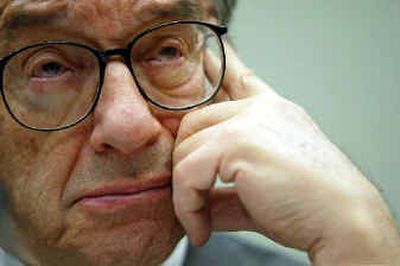Greenspan issues warning about deficit

WASHINGTON — Huge federal budget deficits threaten the nation’s long-term economic stability, Federal Reserve Chairman Alan Greenspan said Thursday as he raised new concerns about impending financing problems in Social Security and Medicare.
A day of reckoning will come, Greenspan warned, because there is no “free lunch.”
Greenspan used a speech to a banking conference in Chicago to make the case again that this year’s president campaign should address reforms of those massive entitlement programs.
Both President Bush and Democratic challenger John Kerry have said they will deal with the shortfalls that will occur in both programs. But unlike Greenspan, the candidates have avoided suggesting that benefits cuts are needed to cope with the financial demands from the retirement of the 77 million members of the baby boom generation.
Speaking by satellite, Greenspan told the conference that he was more concerned about the economic impact of budget deficits than the soaring trade deficit or record levels of household debt.
Normal economic forces will come into play to handle the trade deficit and low savings rates, he said. “The yawning fiscal deficit” will require political action to bring under control, the Fed chief said.
“Our fiscal prospects are, in my judgment, a significant obstacle to long-term stability because the budget deficit is not readily subject to correction by market forces that stabilize other imbalances,” Greenspan said.
Greenspan noted that the federal deficit, estimated by the Bush administration to reach a record $521 billion this year, will amount to 4.25 percent of the total economy. Just four years ago there was a record surplus.